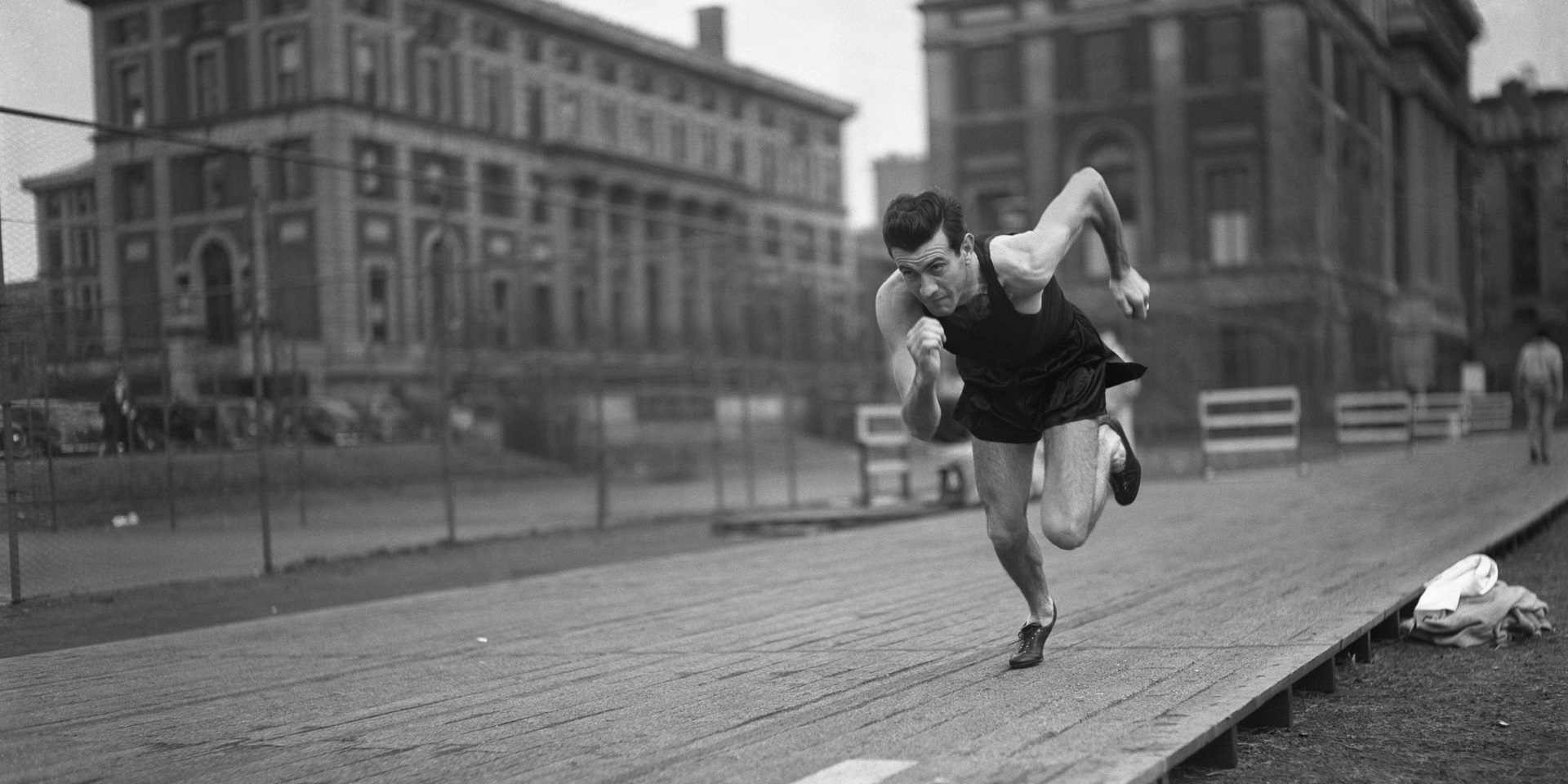Louis Zamperini experienced the bizarre smell of death so many times that he came to the verge of losing his mind. However, he survived, and by choosing to forgive the unforgivable, he was able to breathe life into an entire world.
Louis Silvie “Louie” Zamperini, the second of four children of a Catholic family of Italian immigrants in America, was a problem child, as he himself admitted every time he was asked to recount his life. The lack of socialisation options outside the family turned him into a recluse.
At just six years old, he was smoking cigarette butts that passers-by threw on the street. At eight years old, he drank alcohol that he stole from grocery stores. He was the archetype of a petty delinquent. But the clichés in Zamperini’s story stop there, especially thanks to his older brother Pete.
“Anywhere but in a foot race”
After losing an inter-class high school running contest, Zamperini was so ashamed of his defeat that he ran off the track and hid under the bleachers. He hadn’t even wanted to participate, but he had been convinced by the girls who organised the competition who flattered him until he joined them. Now, from under the bleachers, there was no way he could hear what his brother had caught on the fly: the coach had muttered something like “That kid belongs anywhere but in a foot race.”
Pete, whom Louie would call the perfect brother whenever he got the chance, was so hurt by the insult to his brother that he made him run just to prove to everyone that he could.
He promised to train Louie himself. And so he did. Threatening to club him every time he strayed from the path, it was Pete who initially pushed Louie to become an athlete. And their combined efforts soon paid off.
The first competition he won in high school gave Louie wings and the hope that he could do more than just be a delinquent. His increasing and consistent performances qualified him for a place in the 5,000 metres at the Berlin Olympics in 1936. He didn’t win a medal, but his good time got him noticed by an unrivalled spectator in the stands, Adolf Hitler, who, at the end of the competition, addressed him through a translator saying “Ah, you’re the boy with the fast finish,” after which he shook his hand.
Zamperini was to have much more remarkable achievements, such as the record he set in 1938 in the national collegiate mile (1,609 kilometres). The young student finished in 4 minutes and 8.3 seconds, although his competitors had attempted to spike him and severely cut his shins right during the race. No one was able to break this record for 15 years, earning Zamperini the nickname of “Torrance Tornado.”
Dancing with death
The kid who was once ashamed of his origins had come to represent America, and for Zamperini “more” meant the Olympics in Tokyo that were to take place in 1940. However, the Second World War put an end to the dream and threw the young athlete into an unimaginably cruel race, in which the main competitor was death.
He managed to elude it the first time when the bomber he was aboard as an American soldier on a mission against the Japanese was hit by enemy fire. The aircraft returned to the ground irreparably damaged and full of wounded soldiers. Zamperini was not among them, so he was assigned to another aircraft, known among pilots as “lemon” due to its numerous malfunctions. All this took place only three years after the sweet victory in Berlin.
Less than a month after being assigned to the crew of the new aircraft, during a mission targeting the island of Nauru, one of the engines failed and the plane crashed into the ocean under a barrage of Japanese missiles. No less than 1,370 kilometres separated the crash site from the nearest coast, in the south of the island of Oahu. Among the remains of the plane, only three of the fourteen crew members survived: Zamperini, pilot Phil Phillips, and Francis “Mac” McNamara.
The latter was the first to have a mental breakdown. On their first night adrift on a life raft, McNamara ate all the chocolate bars they had left. When they awoke, the other two realised that all that was left was a small supply of fresh water and the albatrosses flying around the boat.
However, they soon realised that the pestilent smell of albatross meat was good for baiting smaller fish. It was all they could eat raw, without vomiting. That is, of course, if the sharks swarming around the raft didn’t get them first. Roasted by the sun during the day, and freezing during the night, the three men soon ran out of water and were left at the mercy of fate and the storms that arose once every two days.
Two planes flew over them without saving them: one did not see the paint signals in the water, and the second was an enemy plane, which fired until it pierced the raft and also hit McNamara.
The 47 days it took until they were rescued from the ocean were 14 more than McNamara managed to last. Zamperini entrusted the body of his comrade to the ocean, not before saying a prayer made up of fragments he remembered from the movies.
He had never been a believer. However, one of the storms he went through while on the ocean washed his atheism away. “Lord, if you will save me, I will serve You forever!” cried the desperate man. And God heard his prayer. Both he and Phillips survived, but only to be thrown into a prison of torture that would last more than two years.
Zamperini was separated from Phillips and transferred to the Omori camp, where, under the watchful eye of a sociopathic guard, Mutsuhiro “the bird” Watanabe, he experienced daily suffering and humiliation that few people could endure. For example, because Zamperini was known to have been an athlete, the Japanese challenged him to a race against the guards. Emaciated, the American still had the strength to outrun his well-rested and well-nourished opponents.
In return, he was beaten until he collapsed. Still, among all Zamperini’s sad memories, one stands out as a true miracle. “Something went on inside of me. I don’t know what it was,” he confessed, recounting how he resisted, under the threat of death, to hold a heavy wooden beam over his head for several minutes at the order of the Bird. If he had dropped it, he would have been shot. Fortunately, it was the guard who gave in before Zamperini, as he had grown tired of watching, so he charged at him.
The surprise of freedom
During the time he was tortured in the camp, the American was declared a martyr by his people, who had lost all hope that he would still be alive. Therefore, the return to his loved ones was a great surprise. However, it didn’t last long. Zamperini tried to put his life in order and got married, but he could not erase from his mind the images of the war and the pain he had experienced. They resurfaced in the veteran’s mind day after day and night after night. The nightmares soon became unbearable.
In his dreams, he was in the camp again. He dreamed that he was strangling Watanabe with his bare hands. At the end of one of those dreams, Zamperini woke up to his wife’s cries and saw himself with his hands clasped around her neck. At her wits’ end because of the violent outbursts of her husband, who often sought solace in alcohol, Mrs Zamperini was on the verge of filing for divorce.
The woman had recently become a Christian and her devotion, as well as the insistence of some friends from the church, convinced Louis to go and listen to the preacher Billy Graham once.
The sermon reminded Zamperini of the promise he had made to God in the midst of the storm—”I will serve You forever”—and convinced him of one thing: the revolt in his heart against those who had inhumanly tortured him made the freedom he regained a permanent continuation of his confinement. In his heart, Zamperini was still in the camp, although physically he was free.
The veteran then had the epiphany of forgiveness and turned it into the monument of his life. When he chose to forgive, his nightmares dissipated and he was able to bring his freedom as an offering to God. The former prisoner of war travelled wherever he was invited to speak to people about forgiveness and how it can change their lives, just like it changed his own.
Zamperini insisted on returning to Japan and visited the former guards, now imprisoned for war crimes. He assured them that he forgave them and even hugged some of them. It seems that some of them became Christians because of the way Zamperini treated them.
However, Watanabe was nowhere to be found. Some suspected that he had committed suicide, but only God knows the truth. As for Zamperini, whose life ended at the age of 97, following a simple bout of pneumonia, we know that he chose to make poetry out of his suffering.
Four days before his 81st birthday, he achieved his dream of running in the Tokyo Olympics, even if it was only to light the Olympic flame. After all, that’s what he had been doing almost his whole life: through his forgiveness, he had ignited in the hearts of all who knew him the belief that forgiveness can light up their lives.
Alina Kartman is a senior editor at Signs of the Times Romania and ST Network.



















